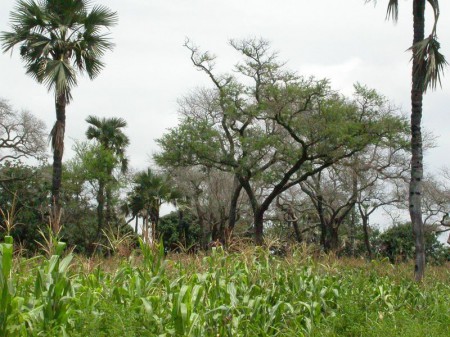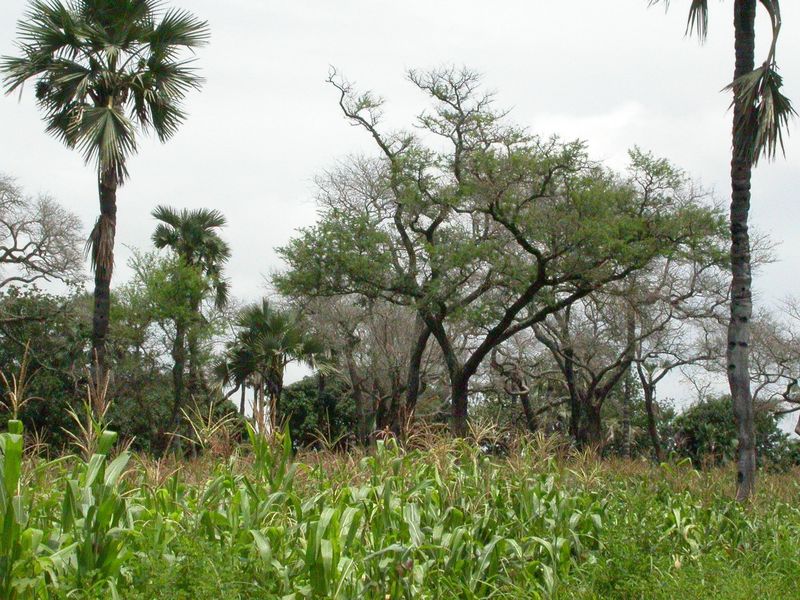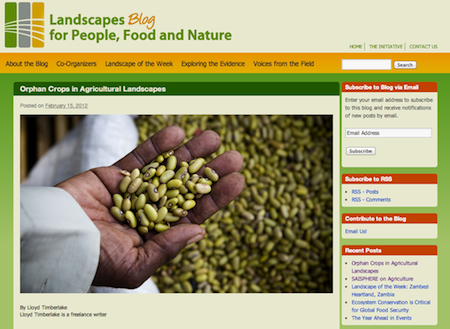- IFPRI and ILRI put out new free tool on documenting gender and assets data for programme evaluations. Apparently, crop diversity not considered much of an asset.
- The pendulum swings on slash-and-burn? One can hope.
- Different goats sound different. Well there’s a thing.
- Denver Botanic Gardens explains how to share herbarium information. CWRs, take note.
- The ITPGRFA gets itself some RSS feeds.
- And WorldFish a podcast.
- Farming for booze? Start of a series at Scientific American blogs. Can you say “contentious”?
Why do celebrities adopt orphans?
Good news from Landscapes for People, Food and Nature. Orphan crops in Agricultural Landscapes, a recent post, tells us why the Green Revolution never took off in Africa (too diverse) and that part of the solution is that “Africa’s varied ecosystems do contain crop species very important to African farm families, if not to science”. The piece goes on to sing the praises of the African Orphan Crops consortium, which is devoting $40 million to sequence 24 species by the end of 2014. You know what we think of that. 1
There’s nothing new to be said about the AOC consortium, but one question remains. Why, in seeking to illustrate orphan crops, does LPFN illustrate its piece with a photo of a hand holding what is clearly Phaseolus vulgaris, a species that is beloved of science, small farmers and consumers in the Great Lakes area of Africa and beyond? 2 We asked the photographer, but he is on assignment. However, our sources in the Nairobi markets confidently identified these, and said that the big yellow ones are known as Ugandan beans. Which is nice, because the actual caption with the photo says that it shows “Constantine Kusebahasa at the market, Rwenzori Mountains, Uganda”. Maybe he’s an orphan.

Oh look! A photo of Faidherbia albida, darling of the AOC consortium, in a landscape, and free to use, found in the Wikimedia Commons.
Nibbles: US Farm Bill, Polish chicks, Young Kenyan farmers, Jowar redux, Handwriting, Erna Bennett, Ant mutualism, Horizontal plastid movement, Horizon scanning
- Policy wonks start to worry about the next US Farm Bill and its effects on poor farmers elsewhere.
- Poles start to worry about their endangered chicks.
- The Youth in Agriculture gives agricultural biodiversity some love on St Valentine’s Day.
- “Can jowar ever replace rice?” Question expecting the answer no? (Jowar is sorghum.)
- Can anyone actually decipher what H.G. Wells wrote to FAO Director Lubin?
- A Memorial Service will be held for Erna Bennett, in English, at 12.30 hrs. on Friday, 9th March at Santa Balbina Church, Viale Guido Baccelli, Rome. It’s near FAO. And no, there’s no link.
- Ants help crop wild relative (among other things).
- Plastids move between crop and wild relative.
- Cambridge boffins look into crystal ball and see fully sequenced, N-fixing perennial cereals growing under sterile conditions. In deep ocean vents.
Nibbles: ICT, New institute, Brit apples, Coconut embryos, Farm cinema, Seeds, Southern obesity, Biofortification, Prize, Kew
- World Bank runs competition to develop climate change app. CCAFS surrenders.
- ICRISAT launches Center of Excellence on Climate Change Research for Plant Protection. CCAFS surrenders.
- Britain’s National Fruit Collection gets grafted.
- COGENT looks for validation.
- Everybody loves timelapse.
- A seed catalogue round-up.
- “True grits“. Worthy, of course, but basically I love the title.
- Not sure why news of a website for the Biofortification Conference held in November 2010 just popped up, but it did.
- Know any good, young, committed, practical, gung-ho, field-tempered, agricultural Norman Borlaug clones? The World Food Prize wants to hear from you.
- The Millennium Seed Bank has a blog. Welcome, seed-dudes!
Nibbles: BGCI database, Lathyrus, IRRI CWR photos, Sweet potato manuals, Rosemary lore, Pig farmer success story, Fancy restaurant, Vavilov’s Principle, Forests, Sorghum, Millet, Kenya and climate change
- GardenSearch just got way more complicated.
- Today’s silver bullet is an Australian grasspea variety. Actually the first Australian grasspea variety.
- Our friend Nik goes to town on IRRI’s wild relatives.
- How to breed sweet potatoes. The saga continues.
- Parsley, sage, rosemary and thyme.
- ILRI uses the particular to make points about the general. Clever.
- Californian fine-foraging. I wonder if any of the diners will also read the following piece and be inspired to do their foraging further afield.
- Angelenos learn about Vavilov’s Principle.
- A forester argues for forests in the Rio+20 process. Mandy Rice-Davies applies.
- Tanzanian Regional Commissioner urges farmers to sow sorghum and millet. If necessary, they can learn from …
- Farmers in Tamil Nadu, who helped scientists learn lots more about local millets, and got a publication into the bargain.
- Who’s doing what in Kenya in climate change adaptation and mitigation. Genebank scrapes in, though not by name, under KARI.

